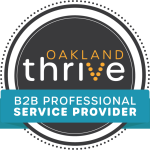At Aqaba Digital, we believe that marketing is poised to reap the most substantial benefits from the evolution of artificial intelligence (AI). From understanding and predicting customer behavior to delivering personalized experiences at scale, AI holds the key to transforming how brands connect with their audiences. But with such vast potential, where should you begin? Let’s break it down.
Why AI is a Game-Changer for Marketing
Marketing’s core functions—understanding customer needs, matching them with products or services, and convincing them to make a purchase—are tailor-made for AI. A 2018 McKinsey study of over 400 use cases found that AI could deliver the greatest value in marketing. This is because AI can dramatically enhance these functions, making your marketing not just smarter but also more efficient and effective.
The numbers speak for themselves. A 2019 survey by the American Marketing Association reported a 27% increase in AI adoption among Chief Marketing Officers (CMOs) over the previous 18 months. By 2020, Deloitte found that three of the top five AI goals were directly related to marketing—ranging from enhancing products and services to deepening customer relationships. Clearly, the AI revolution in marketing isn’t just coming; it’s already here.
The State of AI in Marketing Today
Currently, many companies use AI for specific, narrow tasks like digital ad placements, sales forecasting, and customer service enhancements. AI is also deployed at various stages of the customer journey—starting from when potential customers first consider a product, all the way to post-purchase support.
For example, online retailers like Wayfair use AI to target ads at potential buyers, selecting products based on browsing history. AI chatbots, like those from Vee24, assist in understanding customer needs, guiding their search, and connecting them to human agents when necessary.
AI isn’t just about efficiency; it’s about personalization. It can tailor product recommendations to individual preferences, optimize upselling and cross-selling strategies, and even reduce cart abandonment rates by offering timely nudges like “James from Vermont just bought this same mattress!” After the sale, AI-enabled service agents can handle queries 24/7, providing consistent and scalable customer support.
A Framework for AI in Marketing
Understanding how to classify and implement AI in your marketing strategy is crucial. At Aqaba Digital, we categorize AI applications along two dimensions: intelligence level (ranging from task automation to machine learning) and whether the AI is stand-alone or integrated into a broader system.
- Task Automation: These applications handle repetitive, structured tasks that require minimal intelligence. Examples include simple email automation or basic chatbots that follow a predefined decision tree.
- Machine Learning: This advanced form of AI uses large datasets to make complex predictions, like customer segmentation or sales forecasts. Machine learning drives e-commerce recommendation engines and programmatic ad buying, among other tasks.

- Stand-Alone Applications: These AI tools operate independently from the main channels through which customers interact with your brand. For instance, Behr’s color-discovery app uses AI to recommend paint colors based on customer mood, but the purchase happens outside the app.
- Integrated Applications: These are embedded within existing systems and are often less visible. An example would be Netflix’s recommendation engine, which is seamlessly integrated into the user experience, offering tailored suggestions without requiring users to go to a separate app.
Combining these dimensions gives us four types of marketing AI:
- Less Advanced, Stand-Alone AI: Simple tools like basic chatbots.
- Less Advanced, Integrated AI: Task automation within broader systems, like CRM-linked marketing automation.
- More Advanced, Stand-Alone AI: Sophisticated, yet independent tools like Olay’s Skin Advisor.
- More Advanced, Integrated AI: High-level tools like predictive lead scoring integrated into CRM systems.
The Path Forward: A Step-by-Step Approach
For companies new to AI, starting with simple, stand-alone task automation apps is a wise move. These are easier to implement and offer immediate benefits. Over time, as you build your AI expertise and accumulate data, you can graduate to more advanced, integrated machine-learning applications. These have the potential to deliver the most significant value by automating complex, data-driven decisions.
Overcoming Challenges and Risks
Adopting AI is not without its challenges. Even the simplest AI applications can be difficult to configure and require specialized skills. As you move toward more advanced, integrated applications, the complexity increases, particularly when integrating AI with third-party platforms like Amazon or retail stores.
Privacy and security are also crucial concerns. As AI becomes more sophisticated, customers may worry about how their data is being used. At Aqaba Digital, we recommend establishing ethics and privacy review boards to oversee AI projects, ensuring that customer data is handled responsibly and transparently.
The Future of AI in Marketing
While AI is already delivering substantial benefits, it’s essential to be realistic about its current capabilities. Today, AI can handle narrow tasks but cannot yet manage an entire marketing function. However, its potential is enormous, and we believe that AI will eventually revolutionize marketing. This transformation will take time, and companies must be prepared to invest in building their AI capabilities over the long term.
At Aqaba Digital, we encourage marketers to start developing their AI strategy now. By understanding AI’s current functionality and planning for its future, you can position your brand at the forefront of the AI revolution, ready to capitalize on the opportunities it presents.






